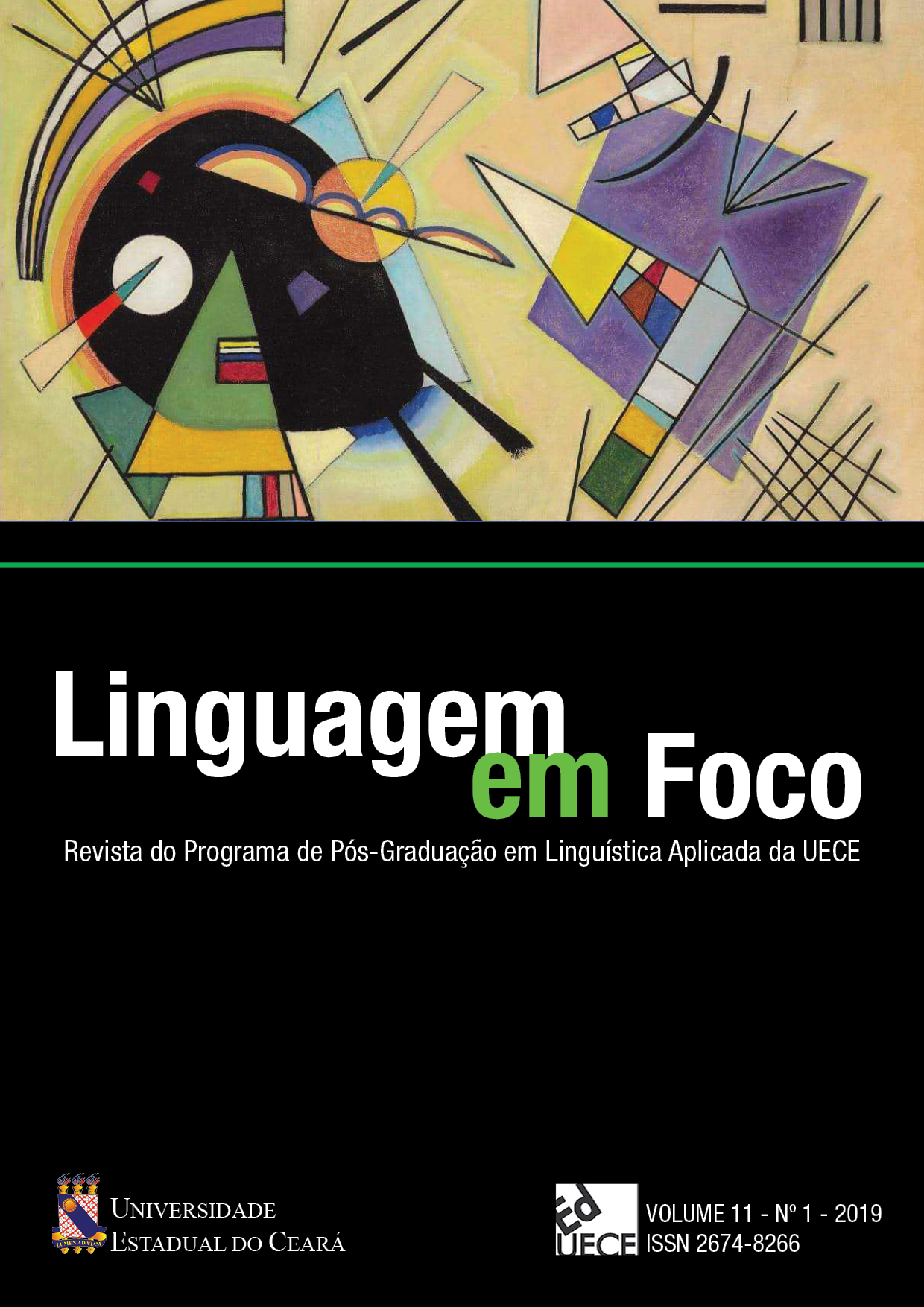The (Not) Artificialization of Text Genres in Teaching Practices of Mother Language
DOI:
https://doi.org/10.46230/2674-8266-11-2939Keywords:
Complexity Theory, Didactic Sequences, Activities, SociocognitivismAbstract
Textual Linguistics contributed to teaching focused in social practices, however, with the difficulty to ally theory and practice, we noticed a process of camouflage of the language structure teaching through textual genres segmentation. The failure of this action raised a point of view of native tongue teaching that proposes the modularization of teaching by establishing an arrangement to study genres: the Didactic Sequences. However, based on Demo (2002), Bakhtin (1997), Franco (2011), Costa (2010) and Costa / Monteiro / Alves (2016), we briefly analyzed an activity that follows this methodology and we noticed the permanence of a fragmented teaching that brings the artificialization of textual genres. In order to present a proposal that we believe to be consistent with current text theories, we also analyzed an activity based on sociocognitivism that, in our opinion, seeks to contemplate textual genres in real situations, conceiving the language as a Complex Adaptive System (CAS). The aim of this article is promoting discussions about widely disseminated teaching practices.
Downloads
References
BAKHTIN, M. Estética da Criação Verbal. 3. ed. (Trad. a partir do francês M. H. GALVÃO). São Paulo: Martins Fontes, 1997.
BAKHTIN, M.; VOLOSHINOV, V. Marxismo e filosofia da linguagem. 12. ed. São Paulo: Hucitec, 2006. 193 p. Disponível em: <http://www.fecra.edu.br/admin/arquivos/MARXISMO_E_FILOSOFIA_DA_LINGUAGEM.pdf> .Acessoem: 15 jan. 2018.
BEAUGRANDE, R. D. New foundations for a science of text and discourse. Freedom of access to knowledge and society through Discourse. Norwood: Ablex, 1997.
CEARÁ, Secretaria de Educação. Siaralendo. In: PreparAção: rumo ao Ensino Médio. Caderno de Língua Portuguesa. v. 1. 2008. p. 17-22.
COLAÇO, M. Níveis de processamento de sentido. Congresso Nacional de Linguagem e Ensino. Pelotas: UCPel, 1998.
COSTA, M. H. A. Linguagem como locução e aprendizagem como cognição situada. Linguagem em foco v. 2, p. 151-167, 2010.
COSTA, M. H. A; MONTEIRO, B. C. B; ALVES, L. E. P. Ensino de leitura na perspectiva do texto como evento: o desafio de fazer emergir o sentido. Diadorim: revista de estudos linguísticos e literários, [S.l.], v. 18, n. 2, dez. 2016. ISSN 1980-2552. Disponível em: <https://revistas.ufrj.br/index.php/diadorim/article/view/5360/3931>. Acesso em: 22 Maio. 2018.
DEMO, P. Complexidade e aprendizagem. São Paulo: Atlas, 2002.
DOLZ, J.; SCHNEUWLY, B. Gêneros orais e escritos na escola. Campinas, SP: Mercado de Letras, 2011. p. 239 (Tradução e organização: R. ROJO; G. S. CORDEIRO).
FRANCO, C. de P. Por uma abordagem complexa de leitura. In: TAVARES, K.; BECHER, S.; FRANCO, C. (Orgs.). Ensino de Leitura: fundamentos, práticas e reflexões para 107 professores da era digital. Rio de Janeiro: Faculdade de Letras da UFRJ, 2011. p. 26-48. Disponível em: <http://www.claudiofranco.com.br/textos/franco_eb ook_leitura.pdf>. Acesso em: 29 jan. 2018.
HANKS, W. F. O que é contexto? In:______. Língua como prática social: das relações entre língua, cultura e sociedade a partir de Bourdieu e Bakhtin. (Orgs.) BENTES, A. C.; REZENDE, R. C.; MACHADO, M. A. São Paulo: Cortez, 2008. p.169-203.
MARCUSCHI, L. A.O papel da linguística no ensino de línguas. Investigações: Linguística e Teoria Literária. Recife, V. 13/14, p. 187-218, 2001.
MONTEIRO, B. C. B. A perspectiva sociocognitiva da referência na abordagem didática do texto: implicações na percepção do leitor aprendiz. 2014. 208 f. Dissertação (Mestrado) - Curso de Letras, PosLA, Universidade Estadual do Ceará, Fortaleza, 2014. Disponível em: <http://www.uece.br/posla/dmdocuments/DISSERTAÇÃO BENEDITA.pdf>. Acesso em: 20 out. 2017.
SIQUEIRA, I. S; GONÇALVES, T. C. Sequências Didáticas: língua portuguesa. Curvelo, 2012. (Apostila).
SWALES, J. M. Genre analysis: English in academic and research settings. Cambridge: Cambridge University Press, 1990, pp.21-66.
Downloads
Published
How to Cite
Issue
Section
License
Copyright (c) 2020 Kandice da Silva Ferreira, Ana Karine Souza, Maria Helenice Araújo Costa

This work is licensed under a Creative Commons Attribution 4.0 International License.
Authors who publish in Linguagem em Foco Scientific Journal agree to the following terms:
- Authors retain the copyright and grant the journal the right of first publication. The articles are simultaneously licensed under the Creative Commons Attribution License which allows sharing the work with an acknowledgement of its authorship and initial publication in this journal.
- The concepts issued in signed articles are the absolute and exclusive responsibility of their authors. Therefore, we request a Statement of Copyright, which must be submitted with the manuscript as a Supplementary Document.
- Authors are authorized to make the version of the text published in Linguagem em Foco Scientific Journal available in institutional repositories or other academic work distribution platforms (ex. ResearchGate, Academia.edu).





























